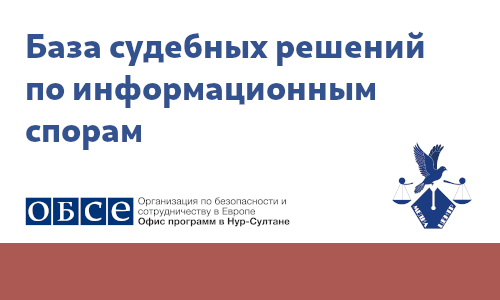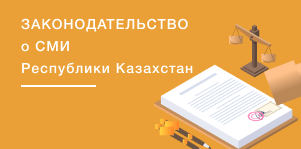


Blogger Askhat Niyazov landed in legal hot water for merely reposting a Telegram comment that the authorities later deemed as objectionable. (Screenshot)
Social media can prove somewhat of a minefield these days for content creators in Kazakhstan. Authorities in the Central Asian nation can be comparatively tolerant of the free-wheeling discourse on social media … that is, until one treads on a sensitive topic. The challenge for bloggers is that the sensitive subjects are not always clearly marked.
One such sensitive topic, it seems, is the accreditation of foreign journalists. After Kazakhstan’s Foreign Ministry assumed authority for accrediting foreign journalists, a controversy brewed in January when officials held up 36 accreditation requests involving personnel working at Radio Azattyq, the Kazakh-language service of RFE/RL. Azattyq is known for its hard-hitting investigative reporting, exposing misconduct at high levels of government and business.
Two Kazakh social media content creators with large followings apparently triggered authorities by expressing support for Azattyq amid the accreditation standoff, and for criticizing pending amendments to the country’s law governing mass media. As a result, they found themselves entangled in the justice system.
Kazakhstan’s senate is currently considering the Media Law amendments after they won approval in mid-April from the lower house of parliament, the Mazhilis. Many of the changes, such as a requirement to increase the percentage of Kazakh language content by 2027, aren’t controversial. Press freedom activists also praise a provision that would establish a statute of limitations for the filing of defamation suits. But a few amendments, especially provisions that expand the government’s licensing and oversight powers, have drawn criticism from observers, who contend the proposed rules can be manipulated to silence dissenting voices and muzzle watchdogs.
“The bill introduces more tools to control the activities of the media,” Diana Okremova, head of the Astana-based human rights NGO Legal Media Center, told Eurasianet. “They include rules about what information can and cannot be published, expanded grounds for refusing accreditation to foreign media, and other prohibitions.”
Compared to many of its Central Asian neighbors, Kazakhstan is permissive of free speech on social media. Freedom House’s most recent Freedom of the Net report, for instance, showed that while Kazakh authorities sometimes restricted access to the Internet in general, they tended not to block social media channels. But official tolerance for social media chatter clearly has limits.
There are a couple of strange aspects to the cases against the two bloggers, Jamilya Maricheva and Askhat Niyazov. One is the time lag between the alleged violations and authorities’ moves to prosecute them.
Their ordeal began on January 10. That’s when Maricheva posted a supportive message concerning Azzatyq’s work on her own Telegram channel, “ProTenge.” “We express our support to our colleagues from Azattyq who are doing very important work for our country,” she wrote.
Three months passed before the authorities took action. Ironically, it was Niyazov, who had reposted Maricheva’s comments, who felt the first administrative blow. The operator of a Telegram channel called “I adore,” Niyazov announced April 10 that law enforcement authorities had opened a case against him for reposting Maricheva’s message of support for Azattyq.
“At first they wanted to open a criminal case, they didn’t succeed, and so they are opening an administrative case,” Niyazov said in a video message.
This unexpected twist for him was followed by an abrupt turn: on April 29, an Almaty judge dismissed the case against him, citing a lack of evidence.
Maricheva, meanwhile, was on the run when authorities caught up to her on April 24. But she wasn’t attempting to flee punishment. She was out jogging in Almaty when authorities stopped her, escorted her into a car and whisked her to a police station for questioning about her online writings.
“In 20 years of work in journalism, I have not seen such resources used for the sake of ONE administrative protocol,” Maricheva wrote in a Facebook post the day after the incident.
Minister of Culture and Information Aida Balaeva, in her own Facebook post, has defended the process, saying her agency had a responsibility to monitor the Internet and refer instances concerning the circulation of “unreliable” information to law enforcement agencies for further investigation.
“I urge mass media and citizens not to spread unreliable and unverified information,” Belaeva’s message concludes.
Perhaps the biggest head-scratcher surrounding the case against Maricheva is that she was detained and questioned a day after RFERL’s announcement on April 23 that it had reached an agreement with the Kazakh Foreign Ministry on the 36 accreditation renewals. The dichotomy in developments suggests that not all Kazakh government agencies are using the same map when it comes to demarcating press-freedom boundaries.
The Maricheva and Niyazov cases may be indicative of the intragovernmental struggles to keep pace with the rapid changes in cyberspace. Yevgeniy Zhovtis, the director of the Kazakhstan International Bureau for Human Rights and Rule of Law, said the Kazakh government’s top priority at present is the preservation of societal stability. Within this context, many officials view social media as a source of disruption.
“The new mass media [amendments] represents an effort to adapt to changing realities,” Zhovtis said. “Historically, media outlets operated with filters, and editors adhered to journalistic standards by focusing on facts over opinions and verifying information. However, the Internet has upended these principles.”
“Officials often opt to tighten controls and impose bans, while equipping law enforcement agencies with the necessary tools to combat the uncontrolled flow of information,” he added. “These trends are not exclusive to authoritarian regimes, like that in Kazakhstan; they also manifest in free societies. A recent example is Georgia, where conflicts have arisen over the foreign agents law.”
The end result of proceedings against Maricheva is likely to be the opposite of what officials hoped for. Prior to this incident, she said she was contemplating shutting down her Telegram channel, ProTenge. Now, she is determined to press on.
“After four years of work, and more than 3,000 publications, I needed to slow down the pace of work in order to exhale. Our readers probably noticed this,” she wrote in a Facebook post. “So thank you to the Ministry of Information for the motivation to continue ProTenge.”





